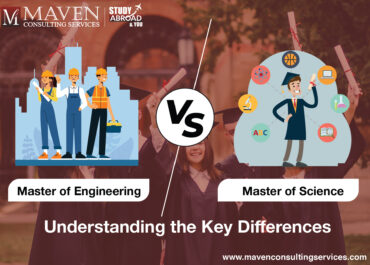How To Choose Specialisation For Masters?

What does the master’s degree mean for your studies?
The Master’s degree is the second degree that you can obtain from universities, universities of applied sciences, pedagogical colleges and other institutions that are allowed to award academic degrees. You can only start a master’s degree program if you have previously successfully completed a bachelor’s degree.

There are two types of master’s studies: the consecutive and non-consecutive master’s.
The consecutive master’s degree builds on the content of your previous bachelor’s degree program. You can only start the consecutive master’s degree in the same subject as the previous bachelor’s degree program or at least in a related subject.
The non-consecutive master’s degree requires a bachelor’s degree, but there is no strict requirement for the subject. The non-consecutive master’s degree does not have to be in the same subject as the bachelor’s degree.
A master’s degree program has a standard period of study of two to five semesters. As already mentioned, the various master’s degree programs are usually based on the previous bachelor’s degree in terms of content. For example, you can register after a previous general bachelor’s degree (e.g. Business administration) with the master’s degree (e.g. in marketing management).
You can either start the master’s degree directly after the bachelor’s degree or study later in the course of your professional life. The latter usually works through part-time studies such as distance learning or evening studies.
Just like in the Bachelor’s degree, ECTS points are awarded in the Master’s degree. The range ranges from 90 to 120 credit points, depending on the duration of the studies. Master’s studies, like all other academic courses, are checked for their quality by an accreditation agency and may only be offered by universities, colleges and universities of teacher education if they successfully pass the examination.
You can get your Masters degree from your home country or go abroad. There are limitless benefits of completing your masters from abroad and it was bring numerous opportunities for you in your future. Studying abroad opens up interesting new paths. Well-known universities provide scholarships and aids that you should apply to. Even a semester abroad brings valued skills that go far beyond improved language skills. Future employers are proven to be open and flexible. In addition, you train your skills to work together in international teams. If you really grab it, you can also complete a complete master’s degree abroad. Great Britain is known for its differentiated offer. Many countries such as Germany, USA, Canada and Australia offer fully funded or partially funded scholarships and grants to international students. Getting in touch with consultants and applying to world’s well-known universities will be your first step towards a bright and successful future.

1. Master in Business Analytics
A master’s degree in business analytics provides students with the necessary skills to make important decisions in the business world. Business analytics includes elements of mathematics, statistics and calculation to provide a broad framework for developing solutions to the business problems that fall within their specific area of responsibility.
Graduates of this master’s degree are in high demand on the labor market and can work in a variety of areas, including but not limited to:
- Product development
- Project management
- Quality control
- Software development
- Administration
2. Master in Accounting
A master’s degree in accounting familiarises students with the most effective methods for calculating, summarising and transmitting important financial information.
All companies strive to earn money, and regardless of the industry, companies need accounting and finance specialists for their daily operations. In general, accounting financial statements cover a variety of business-related topics and serve as excellent ways to get started positions.
Some career roles that a graduate can pursue include:
- Auditor
- Budget analyst
- Finance Director
3. Master in Finance
Those who complete a Master’s degree in Finance have acquired a strong understanding of both the economic and financial principles of the business after graduating. The program content is probably based on examples from corporate and public finance and consolidates a valuable knowledge of how markets work. You will also acquire knowledge of practical methods for investing, risk management, valuation and pricing of financial instruments.
After gaining such a broad understanding, postgraduates in finance can start careers in a variety of different areas, and some career titles can include the following:
- Treasurer
- Personal financial advisor
- Financial analyst
- Auditor
- Budget analyst
4. Master in Business Administration
A Master of Business Economics will emphasise the problem-solving skills required to address and overcome many of the challenges that a growing company could have. The program will serve as a valuable tool for those who believe that their adaptability and problem-solving skills should be improved, and students who want to be international in their perspective will benefit from the inclusion of global political, social and economic discussions in their studies.
Successful graduates have the potential to work in a number of public and private sector organisations as:
- Consultants
- Resource Economists
- Political consultant
- Analysts
5. Master in Project Management
Students enrolled in a master’s degree in project management can expect to complete their course of study with skills that are essential for success in the business world. Students become effective leaders and learn organisational skills such as time management, delegation of tasks and initiation and completion of projects.
While most project management students strive to become project managers, this is not the only career path open to them. They acquire a wide range of skills that make them suitable for a variety of roles in industries such as logistics, engineering or supply chain management, including:
- Project manager
- Director General
- Chief Operations Officer
Tips for choosing a specialisation
In engineering studies, it is important to specialise and choose the appropriate modules at the end of the bachelor’s degree program or at the latest in the master’s degree program. There are usually already a lot of choices at your own university or university of applied sciences. If you also look at the options at other universities, you will quickly come up with an unmanageable variety of focal points. If you are struggling with the choice of specialisation, I would like to give you some advice.
1. Don’t ignore your personal interests, because that only leads to frustration
Suppose there was a major in which, after completion of all associated modules, an employment contract for a well-paid job would be handed over to everyone. Sounds great at first. But what if you are not interested in the content of the focus? You already fell asleep with the basic subjects when the topic was raised? Then at the end of the torture you end up in a workplace where you do something 35 to 40 hours a week that you don’t enjoy. Nobody can stand it.
2. The most important content of engineering studies is to learn how to become a problem solver
This is not stated in any module manual. As an engineer, you will later regularly be confronted with technical problems for which you have to find individual solutions. Even if there is a specialisation in your studies that fits perfectly with your later dream job, only approaches and connections can be taught here. If there were already solutions to the challenges in the profession that could be taught to you during your studies, then it would not be a task for an engineer. Just show how difficult the tasks in the exercises seem if you work on them yourself in advance and how simple and logical everything sounds when the solutions are discussed.

3. The world of work is constantly changing
Some of you also look at the job advertisements of jobs that interest you when choosing your focus. Of course, this is a good first step and can help you get your first job later. However, you have to be aware that the tasks change over time. Be it a new project or you change employer after a few years and do something different than before. If you then put everything on a card to prepare perfectly for a job, you may be at a disadvantage.
4. No focus prepares you perfectly for the later tasks in the job
The variety of possible tasks of an engineer even within a discipline is so great that no study can cover everything. Even with the right focus, not everything specific knowledge can be imparted. You only learn this at work, with a few years of professional experience. It is not for nothing that most large companies offer trainee programs in which the new employees are prepared for the specific tasks in the group after graduation. Otherwise, each position could be filled by graduates with correspondingly lower salary expectations, etc.
5. The right focus in studies is not the most important selection criterion in the selection of applicants
Many underestimate the importance of the human component in the selection of applicants. It is very unlikely, for example, that a chemical engineer will be invited to an interview for a position as a civil engineer. The basics must be right. However, if two applicants have the same technical background except for the main areas of study, further criteria come into play. An example: As a creative free spirit, despite the appropriate focus of study, I may not be in such good hands in a very conservative company. Especially since the 2nd and 4th apply.
Choosing a suitable field of study is certainly helpful for your entry into the world of work. Therefore, a look at the requirements in the job advertisement of the dream job does not hurt. However, no major can prepare you exactly for all tasks and it will always be necessary for you to research yourself and acquire knowledge. Whether you come fresh from university or change jobs later, you will always go through a learning process at the beginning.
Now that I’ve talked about what the best degrees are for higher education, and also some important tips for choosing the right specialisation for you, I hope that this will get you on the right track and help you find exactly what you need. I wish you all the best and a wonderful journey of your masters degree!
Don't forget to share this article




